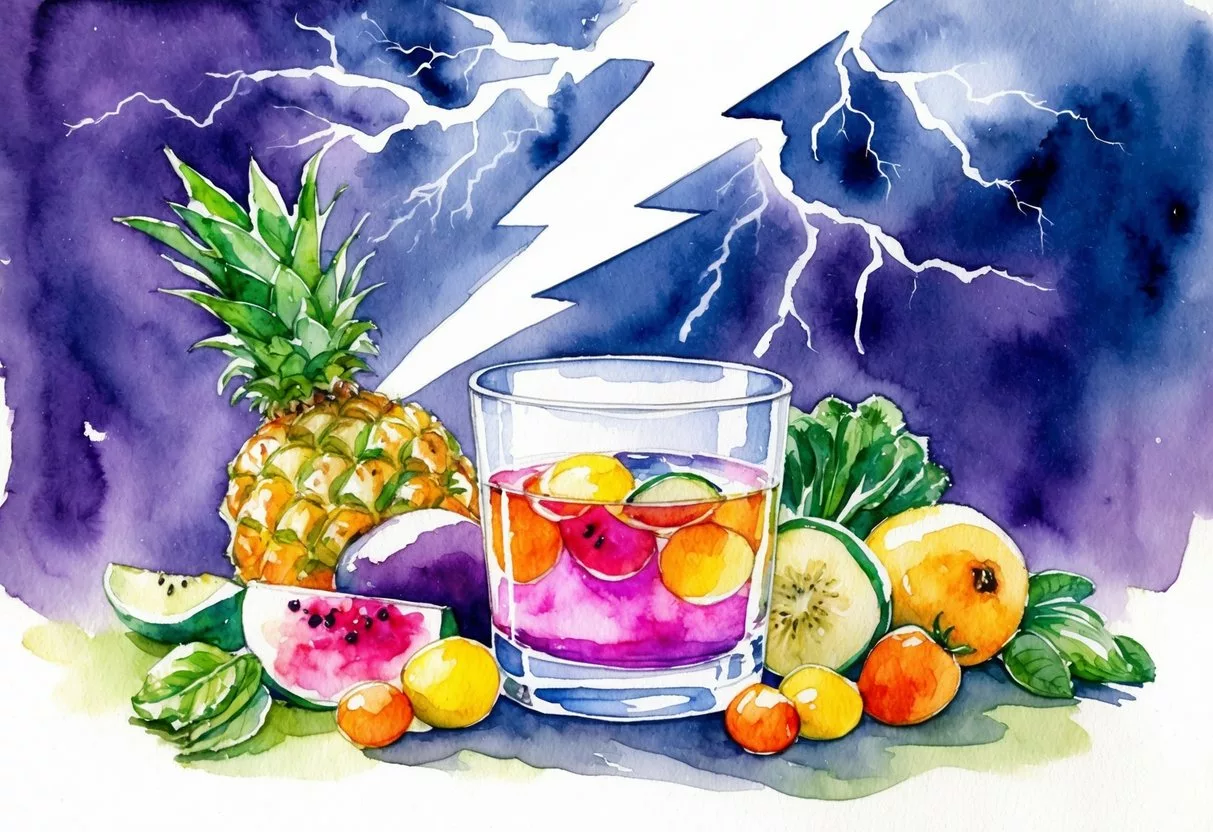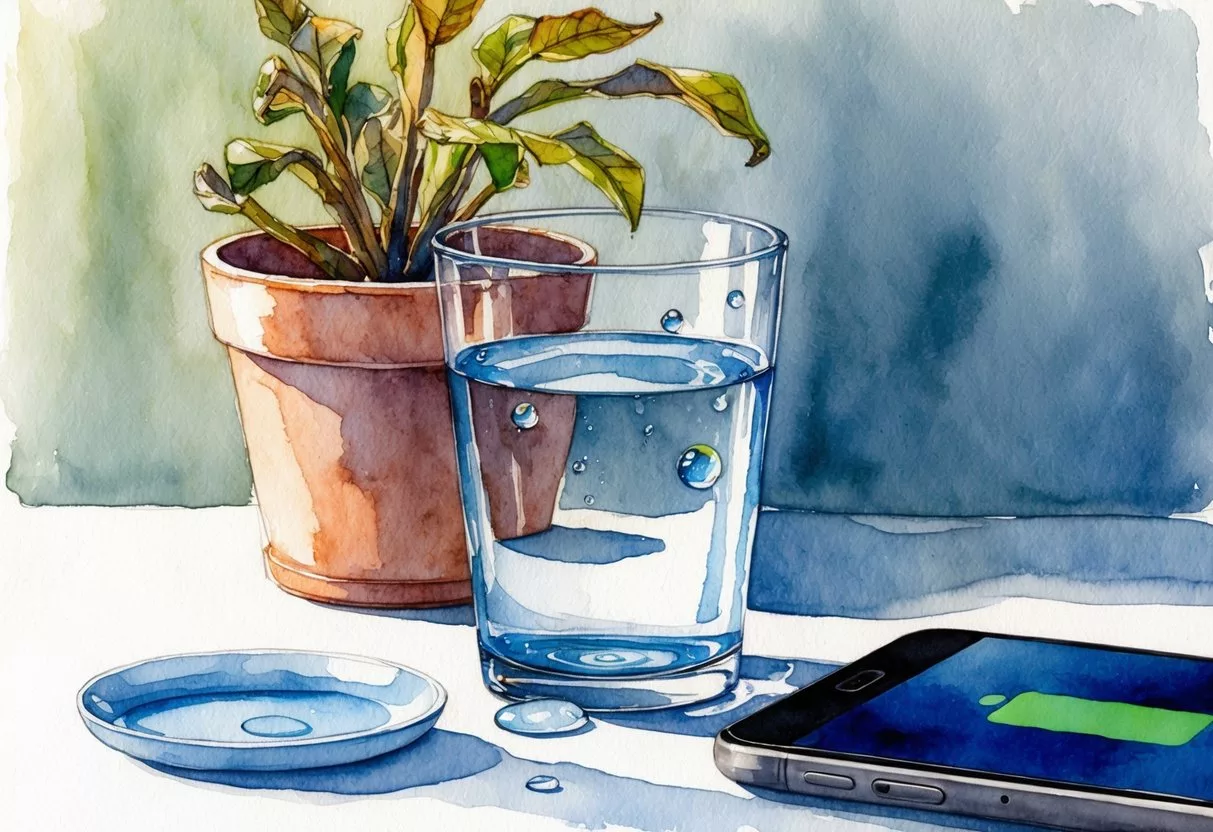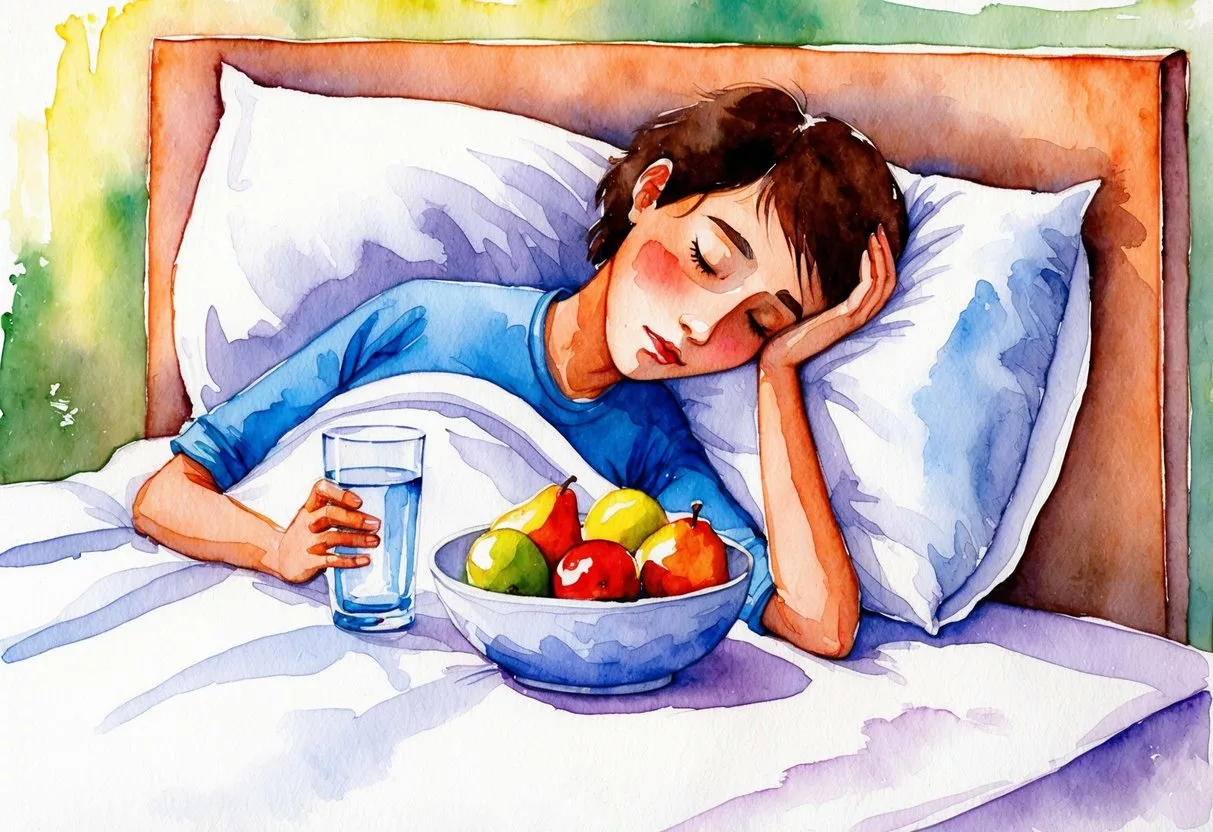Electrolytes are vital minerals in our blood that help our bodies function properly. When these levels drop, it can cause various issues. Low electrolyte levels can lead to muscle weakness, irregular heartbeats, and even seizures in severe cases.

Electrolyte imbalances often result from fluid loss due to sweating, vomiting, or diarrhea. They can also occur from certain medical conditions or medications. Common signs of low electrolytes include fatigue, headaches, and muscle cramps.
Doctors can check electrolyte levels through a simple blood test. If levels are low, treatment may involve oral or IV supplements to restore balance. Drinking fluids with electrolytes and eating a balanced diet can help prevent imbalances.
Key Takeaways
- Low electrolyte levels can cause various symptoms and health issues
- Fluid loss and certain medical conditions are common causes of electrolyte imbalances
- Treatment involves restoring balance through supplements and proper nutrition
Understanding Electrolytes and Their Role

Electrolytes are essential minerals that play a crucial role in many bodily functions. They help maintain proper fluid balance, muscle function, and nerve signaling throughout the body.
Definition of Electrolytes
Electrolytes are minerals in our blood and other bodily fluids that carry an electric charge. The main electrolytes in the human body are:
- Sodium
- Potassium
- Chloride
- Calcium
- Magnesium
- Phosphate
These minerals dissolve in water and create electrically charged particles. The body needs electrolytes to:
- Control fluid levels inside and outside of cells
- Help muscles contract and relax
- Transmit nerve signals
- Regulate blood pH levels
The Importance of Electrolyte Balance
Maintaining proper electrolyte balance is crucial for good health. When electrolyte levels are too high or too low, it can lead to various health issues.
Proper hydration is key to electrolyte balance. Drinking water and consuming electrolyte-rich foods help maintain this balance.
Some ways electrolytes impact the body:
- Sodium and chloride regulate blood pressure and fluid balance
- Potassium helps with heart function and muscle contractions
- Calcium is vital for bone health and blood clotting
- Magnesium supports muscle and nerve function
An imbalance can cause symptoms like muscle weakness, irregular heartbeat, and fatigue. In severe cases, it may lead to more serious health problems.
Causes of Low Electrolyte Levels

Low electrolyte levels can result from various factors, including health conditions, medical events, and lifestyle choices. These imbalances can affect the body’s normal functions and may lead to serious health issues if left untreated.
Chronic Health Conditions
Certain ongoing health problems can cause electrolyte imbalances. Chronic kidney disease often leads to low electrolyte levels as the kidneys struggle to regulate these minerals. Heart failure can also disrupt electrolyte balance due to fluid retention and medication side effects.
Endocrine disorders like diabetes can affect electrolyte levels through increased urination and fluid loss. Long-term malnutrition may result in electrolyte deficiencies due to inadequate mineral intake.
Acute Medical Events
Sudden illnesses or medical situations can quickly deplete electrolytes. Severe vomiting and diarrhea cause rapid loss of fluids and electrolytes. Excessive sweating from intense exercise or fever can also lead to electrolyte imbalances.
Dehydration from any cause can lower electrolyte levels as the body loses both water and minerals. Some medical treatments, like chemotherapy, may affect electrolyte balance as a side effect.
Dietary Choices and Lifestyle Factors
Diet plays a crucial role in maintaining proper electrolyte levels. A low-sodium diet, while beneficial for some conditions, can lead to electrolyte imbalances if taken to extremes.
Excessive alcohol consumption can cause electrolyte loss through increased urination and potential vomiting. Certain medications, especially diuretics, can affect electrolyte levels by increasing fluid excretion.
Extreme fasting or very low-calorie diets may result in electrolyte deficiencies due to insufficient mineral intake. Overhydration, or drinking too much water, can dilute electrolytes in the body, leading to imbalances.
Symptoms and Signs of Low Electrolytes

Low electrolyte levels can cause a range of symptoms affecting different body systems. These signs can vary depending on which specific electrolytes are imbalanced.
General Symptoms
Fatigue and weakness are common signs of low electrolytes. People may feel tired and have trouble with daily activities.
Muscle cramps can occur, especially in the legs. These may be painful and happen suddenly.
Dizziness and headaches are other possible symptoms. Some people feel lightheaded or have trouble with balance.
Nausea may occur, sometimes with vomiting. This can make the electrolyte imbalance worse.
In severe cases, seizures or even coma can happen. These are medical emergencies needing quick treatment.
Specific Electrolyte Deficiencies
Low sodium can cause confusion and mental changes. People may act strangely or have trouble thinking clearly.
Potassium deficiency often leads to irregular heartbeats. This can feel like heart palpitations or a racing pulse.
Low calcium may cause muscle twitches or spasms. In some cases, it can affect muscle contractions throughout the body.
Magnesium deficiency can result in tremors and muscle weakness. It may also cause changes in mental state.
Diagnosing Electrolyte Imbalances
Doctors use several methods to check for low electrolytes. These tests help pinpoint which electrolytes are out of balance and by how much.
Blood Tests and Diagnostics
The main way to check electrolyte levels is through blood tests. A basic metabolic panel is often the first test done. It checks sodium, potassium, and calcium levels in the blood.
For a more detailed look, doctors may order a comprehensive metabolic panel. This test checks more electrolytes like phosphate. It also looks at other substances in the blood.
Blood plasma tests can show electrolyte concentrations in the liquid part of blood. This gives a clear picture of electrolyte balance in the body.
Doctors may also check urine samples. These can reveal how well the kidneys are handling electrolytes.
Interpreting Test Results
Normal electrolyte ranges vary slightly between labs. Generally, sodium levels should be 135-145 mEq/L. Potassium should be 3.5-5.0 mEq/L. Calcium levels typically fall between 8.5-10.5 mg/dL.
Results below these ranges may indicate low electrolytes. Very low levels can be dangerous and need quick treatment.
Doctors look at all results together, not just single values. They consider the patient’s symptoms and health history too. This helps them make the right diagnosis and treatment plan.
Consequences of Unaddressed Electrolyte Imbalances

Low electrolyte levels can lead to serious health issues. The effects range from mild symptoms to life-threatening conditions if left untreated.
Short-Term Effects
Electrolyte imbalances can cause immediate problems. Low sodium (hyponatremia) may lead to headaches, confusion, and seizures. Hypokalemia, or low potassium, can result in muscle weakness and cramps.
People with low magnesium (hypomagnesemia) might experience fatigue and muscle spasms. Hypocalcemia, or low calcium, can cause numbness and tingling sensations.
These imbalances can also affect the heart. An irregular heart rate may develop, putting strain on the cardiovascular system.
Long-Term Complications
Chronic electrolyte imbalances can have severe consequences. Ongoing hypokalemia may lead to kidney problems and high blood pressure.
Long-term hypophosphatemia can weaken bones and impair nerve function. Persistent low magnesium levels might increase the risk of heart disease.
Untreated electrolyte imbalances can cause lasting damage to organs. The kidneys may struggle to maintain proper fluid balance, potentially leading to kidney failure.
The heart is particularly vulnerable. Chronic imbalances can cause permanent changes in heart rhythm and increase the risk of heart attacks.
Treating Low Electrolyte Levels
Treating low electrolyte levels involves both quick fixes and long-term solutions. The approach depends on the severity of the imbalance and its underlying cause.
Immediate Interventions
For mild cases, drinking electrolyte-rich fluids can help restore balance. Sports drinks or oral rehydration solutions are good options. In severe cases, IV fluids may be needed.
Doctors might prescribe electrolyte supplements in pill or liquid form. These can quickly boost specific electrolytes like sodium or potassium.
For dangerously low levels, emergency treatment is crucial. This may include:
- IV fluids with electrolytes
- Medications to manage symptoms
- Close monitoring of vital signs
Long-Term Management
Maintaining proper electrolyte levels often requires lifestyle changes. A balanced diet rich in fruits, vegetables, and lean proteins can help.
Regular hydration is key. Drinking water throughout the day keeps electrolytes balanced. For those who sweat a lot, electrolyte drinks may be beneficial.
Some people may need ongoing medical care. This could involve:
- Regular blood tests to check electrolyte levels
- Adjusting medications that affect electrolytes
- Managing underlying conditions like kidney problems
In rare cases, treatments like hemodialysis might be necessary to maintain electrolyte balance long-term.
Prevention and Maintenance of Healthy Electrolyte Levels

Keeping electrolytes balanced involves proper diet, hydration, and self-care. These strategies help maintain optimal levels and prevent imbalances that can affect health.
Dietary Recommendations
A balanced diet is key for maintaining healthy electrolyte levels. Fruits and vegetables are excellent sources of essential minerals.
Potatoes provide potassium and magnesium. Avocados offer potassium and healthy fats. Oranges and strawberries supply vitamin C and potassium.
Bananas are well-known for their potassium content. Spinach is rich in magnesium and calcium. Turkey contains sodium and phosphorus.
People should aim to include a variety of these foods in their meals. This helps ensure a steady intake of different electrolytes throughout the day.
Hydration Strategies
Proper hydration is crucial for maintaining electrolyte balance. Water is the best choice for daily hydration needs.
For intense exercise or hot weather, sports drinks can help replace lost electrolytes. These drinks contain sodium, potassium, and other minerals.
Coconut water is a natural alternative to sports drinks. It’s rich in potassium and other electrolytes.
Electrolyte solutions are useful for treating dehydration. They can be bought or made at home with water, salt, and sugar.
It’s important to drink fluids regularly throughout the day. This helps prevent dehydration and keep electrolytes in balance.
Monitoring and Self-Care
Regular check-ups can help detect electrolyte imbalances early. Blood tests can measure electrolyte levels accurately.
People should be aware of symptoms that may indicate an imbalance. These can include:
- Muscle cramps
- Fatigue
- Irregular heartbeat
- Confusion
During illness, especially with vomiting or diarrhea, it’s crucial to replace lost fluids and electrolytes.
Athletes and those who sweat heavily should pay extra attention to their electrolyte intake. They may need to supplement more than the average person.
Frequently Asked Questions

Electrolyte imbalances can cause various symptoms and health issues. Understanding the signs, causes, and remedies is crucial for maintaining proper bodily functions and overall well-being.
What are the signs and symptoms indicating an electrolyte imbalance?
Common signs of electrolyte deficiency include muscle cramps, fatigue, and weakness. People may also experience an irregular heartbeat, dizziness, and confusion.
Excessive thirst, dry mouth, and infrequent urination can also point to an electrolyte imbalance.
How can electrolyte imbalance be corrected at home?
Drinking fluids rich in electrolytes can help correct mild imbalances. This includes sports drinks, coconut water, or homemade oral rehydration solutions.
Eating foods high in electrolytes, such as bananas, avocados, and leafy greens, can also help restore balance.
What are the potential consequences of prolonged low electrolyte levels?
Prolonged electrolyte imbalances can impair crucial bodily functions. This may lead to muscle weakness, irregular heart rhythms, and blood pressure changes.
In severe cases, it can cause seizures, confusion, and even organ failure.
What factors typically lead to electrolyte deficiencies in the body?
Excessive sweating, vomiting, and diarrhea can cause electrolyte loss. Certain medications, kidney problems, and inadequate dietary intake can also lead to deficiencies.
Dehydration is a common factor that can disturb electrolyte balance.
How long does it typically take to recover from an electrolyte imbalance?
Recovery time varies depending on the severity of the imbalance and the treatment approach. Mild cases may resolve within a few hours to a day with proper hydration and nutrition.
More severe cases may take several days and require medical intervention.
What beverages are recommended for restoring electrolytes effectively?
Sports drinks are commonly used to replenish electrolytes. Coconut water is a natural alternative rich in potassium and other electrolytes.
Milk contains several important electrolytes and can be an effective option. For those with specific needs, oral rehydration solutions can provide a balanced electrolyte mix.